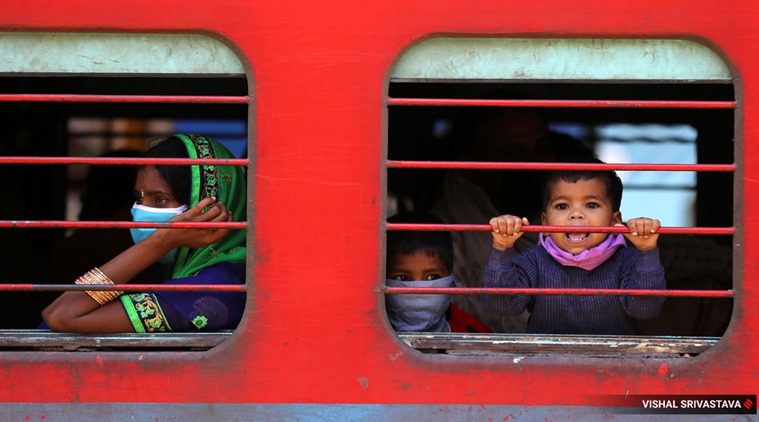 A Bench of Justices Ashok Bhushan, S K Kaul and M R Shah, which had taken suo motu cognizance of the migrant labour issue, also said that High Courts that had issued orders on the matter were within their rights to do so. (Representational)
A Bench of Justices Ashok Bhushan, S K Kaul and M R Shah, which had taken suo motu cognizance of the migrant labour issue, also said that High Courts that had issued orders on the matter were within their rights to do so. (Representational)
Having refused several times earlier to intervene on the issue of migrant labourers, the Supreme Court on Tuesday ordered states and Union Territories to complete the process of sending them back to their home states within 15 days.
It also asked them to consider withdrawing cases registered against the migrants for trying to walk to their homes flouting lockdown rules, and urged states and UTs to work on “the next stage of attending (to their) needs”.
A Bench of Justices Ashok Bhushan, S K Kaul and M R Shah, which had taken suo motu cognizance of the migrant labour issue, also said that High Courts that had issued orders on the matter were within their rights to do so. “High Courts being constitutional courts are well within their jurisdiction to take cognizance of violation of fundamental rights of migrant workers and we have no doubt that those proceedings shall proceed after considering all aspects including the response of concerned authorities.”
Appearing for the Centre in the Supreme Court on May 28 in a PIL on migrant distress, Solicitor General of India Tushar Mehta had criticised high courts saying some “are running a parallel government”, apparently referring to their interventions in the matter. The Supreme Court had earlier declined several appeals to intervene. A different Bench had wondered how it could stop migrants from walking.
The Bench of Justices Bhushan, Kaul and Shah took up the matter in the last week of May, directing that no fare be charged from migrant labourers for their journey home, and that arrangements be made to provide them food.
On June 5, the Bench said it intends to give states and UTs 15 more days to transport migrants. Giving the formal order for the same Tuesday, the Court said, “All the learned counsel for the States are agreeable that within maximum 15 days, all stranded workers will be transported from places where they are stranded.”
It noted that there was a demand for 171 Shramik trains between June 3 and 16, and said if there is a need for additional trains, the Railways shall provide the same within 24 hours.
Since May 1, the Railways has operated more than 4,347 Shramik Special trains, transporting approximately 60 lakh people to their home states.
Taking an empathetic view of their plight, the Court said the migrant labourers had been forced to leave “by force of circumstances”, and asked states to consider withdrawing cases against them for violating lockdown norms.
Having gone through affidavits filed by states, the Bench said a majority of the migrant labourers had already reached their native places. It asked states and UTs to take care of them now, adding “the first step in this regard is to maintain (a) record of all such migrant workers”. “The details of migrant workers, nature of their skill, place of their earlier employment be maintained… so that necessary help can be extended…”.
The Court suggested that states set up counselling centres to provide information regarding government schemes and other avenues of employment and “where possible to expand the avenues of employment…”. It also asked the Centre to bring on record the schemes that can be undertaken by labourers.
While it spoke of Uttar Pradesh submitting that 25 lakh migrants had returned and that institutions had proposed employment for about 11 lakh of them, the Court made a special mention of Maharashtra regarding the return of migrants home. “State has to take a more vigilant and concentrated effort in identifying the migrant workers, who are still stranded in State of Maharashtra and who are willing to return to their native places,” it said, adding that they should be provided food and shelter and warned against any complaint regarding the same.
The Supreme Court said states and UTs must closely monitor the measures, schemes and benefits announced for migrants to ensure these reach those for whom they are meant, and said law enforcing agencies must deal with them in a “humane manner”. While seeking action on lapses, it said, “we also have no doubt that most of the officers, staff of administration and police are discharging their duties with devotion and hard work”.
The Court granted the states and UTs two weeks to submit additional affidavits in response to various related aspects.
The Bench also complimented NGOs and individuals for helping out migrants.